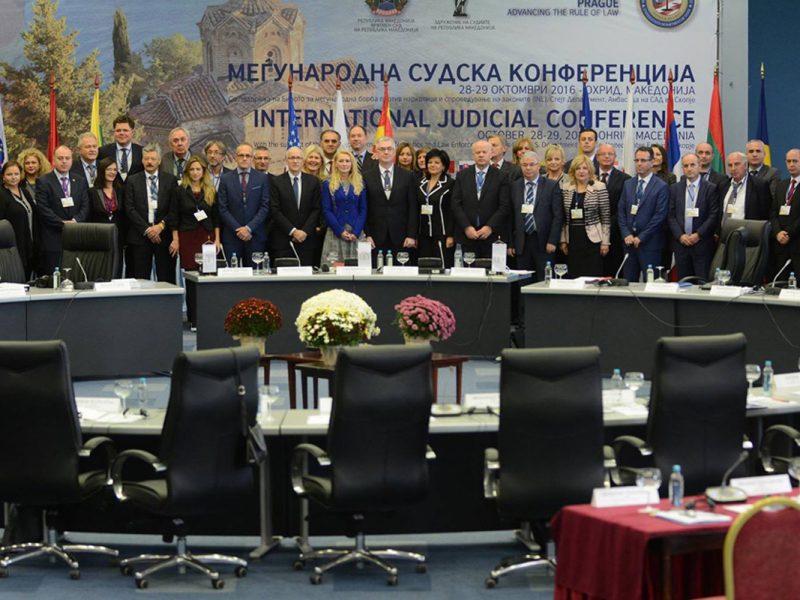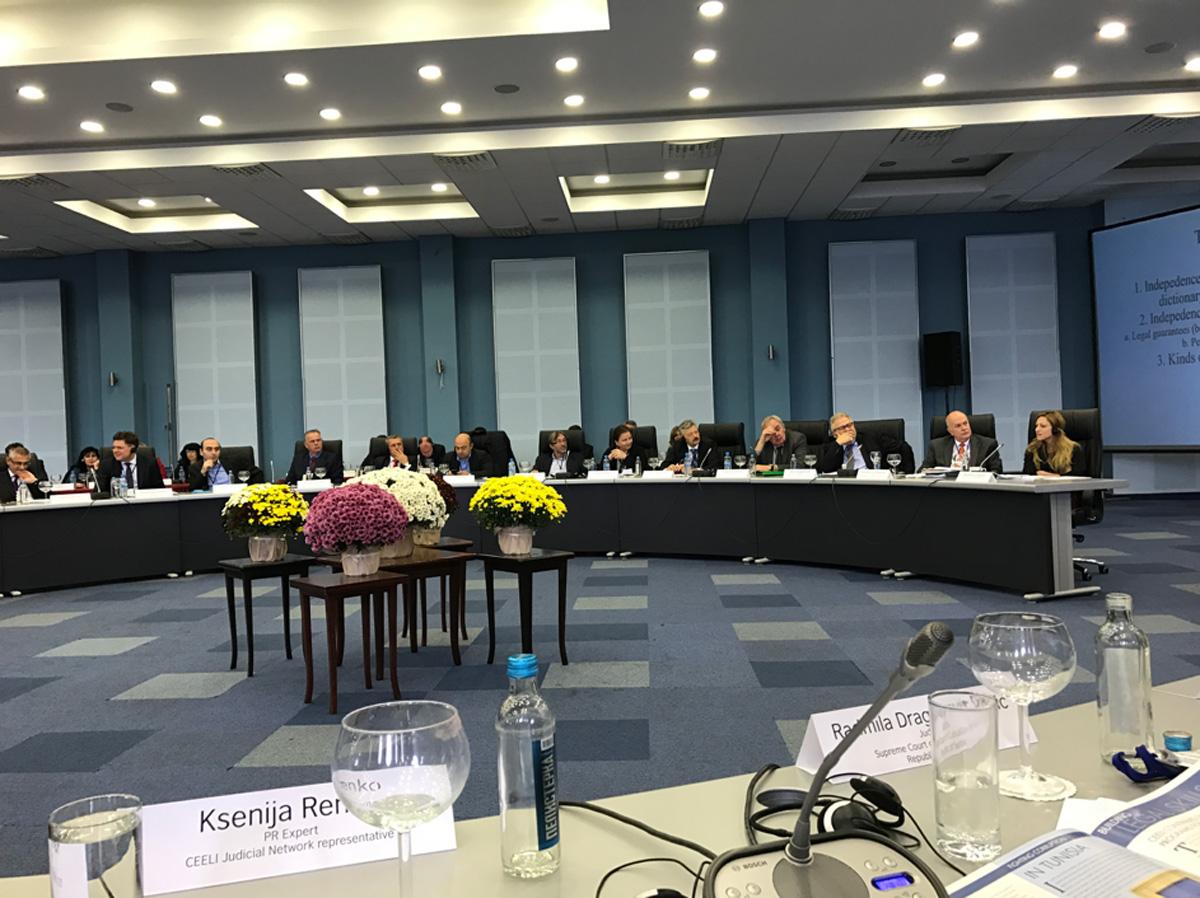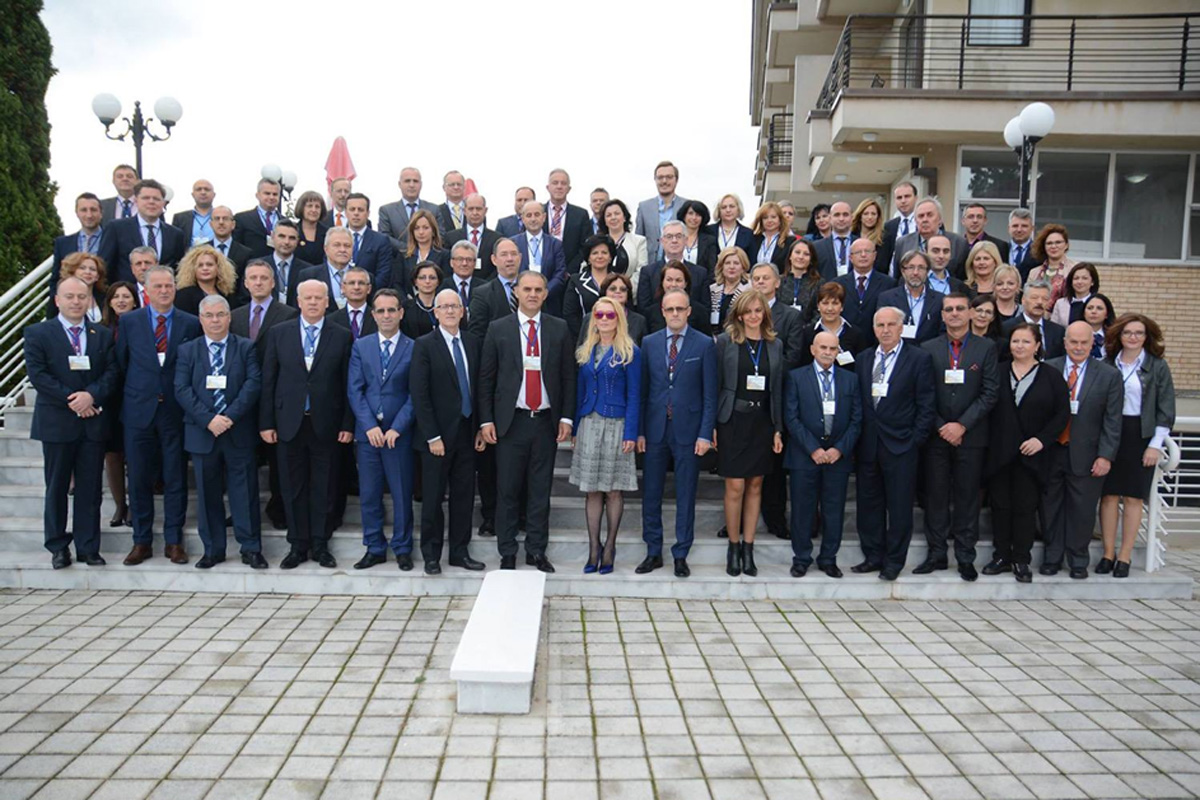International Judicial Conference on Independent Judiciary emphasis importance of Strategic Communication on courts

October, 2016, Ohrid, Macedonia
The purpose of the International Judicial Conference organized by the Supreme Court of the Republic of Macedonia, The Macedonian Judges Association and The CEELI Institute in Prague, and with the support of the Embassy of the United States in the Republic of Macedonia as well as Bureau of International Narcotics and Law Enforcement Affairs, was to strengthen the capacities and cooperation between associations of judges, the European Network of Judicial Chambers and other relevant partners and to establish standards to strengthen the independence of the judiciary by reviewing and re-examining the provisions of all types of judicial responsibility – of criminal, civil or disciplinary liability. Enhancing transparency of judiciary towards media with adequate respect of the principles of an independent judiciary, rights of individual and protection of public interest was also one of the important initiatives of this conference.
International Judicial Conference was opened by Ms. Lidija Nedelkova, President of the Supreme Court of the Republic of Macedonia, David Stephenson, Pol/Econ Chief, US Embassy to the Republic of Macedonia, Christopher Lehmann, Executive Director the CEELI institute in Prague and Judge Djemali Saiti, Ph.D., President of the Macedonian Judges Association
The main goal of the International Judicial Conference was to initiate legislative reforms by making recommendations, as well as strategic judicial reform guidelines that will guarantee fair trial, strengthen judicial independence, transparency and accountability, and promote regional commitment to the rule of law. The lack of debate between judges and the exchange of good practices and experiences was the main motive for this regional co-operation which will further strengthen the capacities and co-operation of regional associations of judges, the European Judicial Council Network and the CEELI Institute, resulting in the publication and dissemination of detailed information, reports and joint publications, judicial opinion surveys and analytical documents.
The topics on importance of communication with the media and the public and communication as a basis for building trust were presented by international judges and experts with significant expertise in this fields. On the panel on relation between media and judiciary were included Judge Wlodzimierz Wróbel, Supreme Court of the Republic of Poland, Judge Faik Arslani, Supreme Court of the Republic of Macedonia and communication expert Ms. Ksenija Renko, Jupiter Strategic Communication, from Croatia.

Very often judges are subject to public and media influences. Although their personal opinion must not have an impact on the judicial decision in any case – not only because public and media opinions are often legally irrelevant, but also because they are often based on incomplete or fabricated information – sometimes such public criticism is a consequence of dissatisfaction of certain parties or interest groups, especially when it comes to a process that is of significant public interest. Due to such pressure, judges sometimes bring unexpected and surprising verdicts. Consequently, the public tends to interpret their decisions as unjust, due to common belief that they were brought under pressure from certain interest groups. In this context, one must consider the fact that a judge, considering a psychological angle, is also open to the influence of the media as any other human being. With an aim to protect and save independence and impartiality of judiciary, judge’s professional duty is to be resolutely and indisputably responsible in their communication with public and media.
To perform successfully its noble and demanding mission, courts need to improve and settle a sustainable system of strategic communication. Such system will allow efficient and effective functioning because the courts should become a place where all employees have to own organization’s mission and vision, its social goals and common values to share. They must know individual and team assignments and be familiar with the information flow. In a situation when external communication is constantly under public scrutiny, the high-quality internal communication is a must for the organization such as the court. Successfully designed and implemented, internal communication provides good functioning of the organization and satisfaction of employees who work there. It gives the opportunity for professionals to share their opinions and suggestions about the work they do, about their working environment, motivation, and above all provides a secure and reliable flow of information, which are mainly of a very delicate and confidential nature.

Due to the importance of public interest and the necessity to follow legal norms, judicial profession is by its nature considered to be within the field of crisis communication. For this reason, it is necessary to pay special attention to every aspect of the content of the crisis protocols, to the training of its users, and to define very clear guidelines about what to communicate, who communicates it, how often and in what way.
Being aware of the above, and in compliance with the court development strategy, the leaders and the judges have to decide to undertake the necessary step and to invest their time and resources in upgrading the system and culture of internal communication on courts. These communication basics may seem clear and unambiguous. However, in a new set and demanding organizational systems such as courts, organization encounters numerous obstacles and hurdles in every day communication: because of the sensitivity and complexity of its work, remarkable public exposure of the organization, the scope of work and the number of employees.



